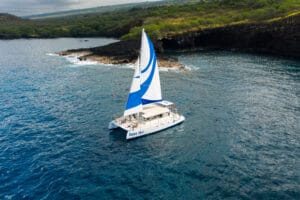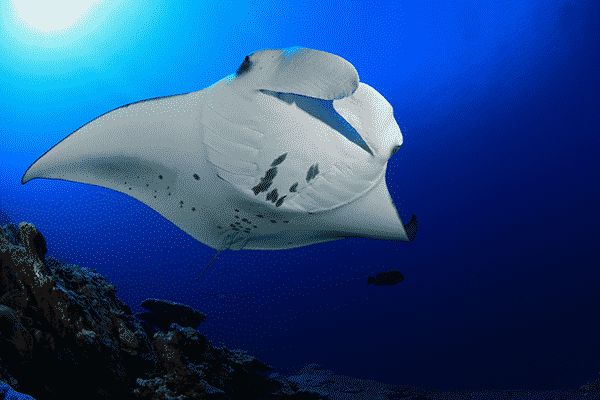Join Sea Paradise’s amazing crew on the modern Hoku Nui catamaran and sail out on the crystal blue waters of the Kona Coast for a snorkel tour. This is the best way to get out to the most famous snorkeling spot on the West Coast of Hawaii. Snorkel in front of the historic Captain Cook Monument in Kealakekua Bay and create a beautiful Hawaiian memory!
You might see a local resident, the Hawaiian Green Sea Turtle.
The Hawaiian green sea turtle (Chelonia mydas), also known as honu, is a large sea turtle that is native to the Hawaiian archipelago. It is the largest hard-shelled sea turtle in the world, reaching lengths of up to four feet and weighing over 300 pounds.
Honu have a brown or black carapace (upper shell) with yellow and light brown streaks. Their plastron (bottom shell) is a light yellow. As adults, honu mainly eat algae and seagrasses, which turn their fat layer green and gives them their common name.
Honu are found in all of the Hawaiian Islands, but they are most common in the Northwestern Hawaiian Islands. They are also found in other parts of the Pacific Ocean, including the Caribbean Sea, the Gulf of Mexico, and the Indian Ocean.
Honu are a threatened species, and their numbers have declined significantly in recent years. The main threats to honu include:
- Habitat loss and degradation
- Fishing nets and other marine debris
- Climate change
- Disease
There are a number of things that can be done to help protect honu, including:
- Reducing pollution and marine debris
- Protecting their nesting beaches
- Raising awareness of the threats to honu
Honu are an important part of the Hawaiian ecosystem, and they play a vital role in the marine food web. By taking steps to protect honu, we can help ensure their survival for future generations.
Here are some fun facts about Hawaiian green sea turtles:
- Honu can live for over 100 years.
- They can dive up to 1,500 feet.
- They are excellent swimmers and can travel long distances.
- Honu are herbivores, and their diet consists mainly of algae and seagrasses.
- Honu are a keystone species, meaning that they play an important role in the ecosystem.
If you see a Hawaiian green sea turtle in the wild, please give it plenty of space and do not disturb it. You can also help by reporting any injured or stranded turtles to the authorities.
